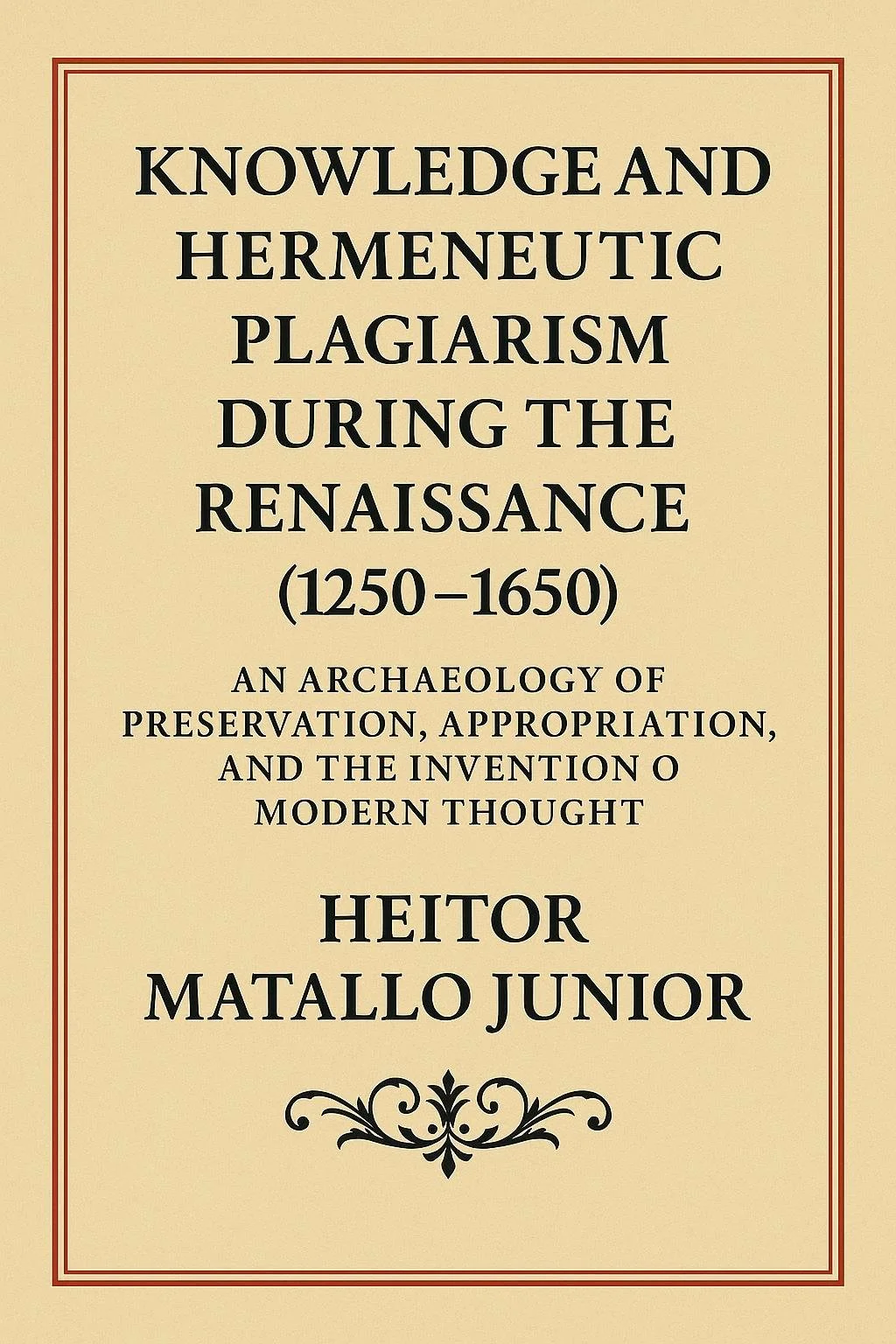
The Thought Archive
by Heitor Matallo Junior
The Thought Archive is not a repository of answers, but a field of echoes — where ideas resurface, reconfigure, and reveal their hidden genealogies.
Here, language is not a tool but a terrain. Thought is not linear, but layered. And knowledge is not simply accumulated — it is interpreted, inherited, and transformed.
This site gathers fragments of a larger investigation: how interpretation shapes what we call "truth"; how silence, erasure, and appropriation have configured the history of knowledge; and how hermeneutics remains essential in an age of acceleration and noise.
Essays, books, and reflections presented here belong to a long philosophical lineage — but they also seek to reimagine that lineage. From the monasteries of the Middle Ages to the edge of quantum consciousness, The Thought Archive is a place to read, reflect, and remember.

Upcoming books and articles
Knowledge and Hermeneutic Plagiarism during the Renaissance (1250 - 1650): An Archaeology of Preservation, Appropriation, and the Invention of Modern Thought
By tracing intellectual practices from antiquity to the Renaissance, this book redefines plagiarism as a mode of knowledge survival—an instrument of transmission, transformation, and reinvention. From Pliny to Paracelsus, and from the School of Toledo to Leonardo, it reveals how modern thought was shaped as much by strategic appropriation as by innovation.
Each chapter explores how forgotten ideas were preserved, reengineered, or silently borrowed. Drawing on logic, epistemology, and the history of science, the book offers a framework for evaluating modes of intellectual appropriation. Hermeneutic plagiarism becomes a lens for reading the genealogy of modern knowledge. More than a historical study, this is a philosophical invitation to rethink authorship. It interrogates the boundaries between creativity and transmission. And it recovers the invisible labor behind the canon.
The Shape of Understading: A philosophical exploration of interpretation, science, and the epistemic limits of observation
Rejecting static models of interpretation, it traces how meaning emerges in cognition, mathematics, physics, and multispecies ecologies. Each chapter offers a case study of how understanding unfolds within distinct epistemic regimes. From ancient exegesis to neural inference and environmental co-relations, interpretation is shown as foundational to all knowing.
The book questions the neutrality of language and the objectivity of science, revealing their interpretive scaffolding. It bridges philosophy of science, phenomenology, cognitive theory, and environmental humanities. Ambiguity is not treated as error, but as the ground of comprehension itself. A contribution to contemporary hermeneutics, it invites us to rethink how reality becomes legible.
Monasteries as Innovation Machines: The Medieval Ecosystem of Progress during the period 650 to 1250.
This book redefines medieval monasteries as engines of innovation rather than passive custodians of tradition.
Between the 6th and 13th centuries, monastic networks fostered technical, intellectual, and organizational advances. Through case studies of Benedictine, Cistercian, and Carolingian communities, it reveals a rich epistemic ecology. Rooted in ritual, silence, and material experimentation, monasteries shaped knowledge through practice and imagination. They standardized agriculture, refined engineering, regulated time, and preserved ancient systems of thought. Far from being isolated, they acted as transregional hubs of translation and adaptation.
The book shows how modernity owes its scaffolding to monastic infrastructures of memory and innovation. It offers a new theory of progress grounded in discipline, devotion, and cultural transmission.
The Hermeneutic Challenge in Quantum Physics : Why interpretation matters as much as calculation
This article examines the interpretive crisis in quantum physics through the lens of philosophical hermeneutics. It argues that confusion around quantum theory stems not only from its complexity, but from a deeper hermeneutic deficit in how meaning is constructed and communicated.
Drawing on Gadamer’s notion of a crisis of intelligibility, the paper shows how metaphors like “particles that decide” obscure more than clarify. This deficit appears in both public discourse and scientific practice, where interpretations—Copenhagen, Bohmian, QBism—reflect socially embedded epistemic cultures.
Rather than seeing interpretation as a failure of objectivity, the article reframes it as a dynamic, situated process shaped by experimental and institutional contexts. Building on Rheinberger and Knorr-Cetina, it proposes a hermeneutic model that embraces epistemic plurality.
About the author
Heitor Matallo Junior is a philosopher, former professor, and international expert in knowledge systems and cultural preservation. With a background in logic, epistemology, and the history of science, he spent over 15 years at the United Nations, where he led global programs on knowledge governance and sustainability. He now writes at the intersection of historical inquiry, philosophical reflection, and interpretive theory.
